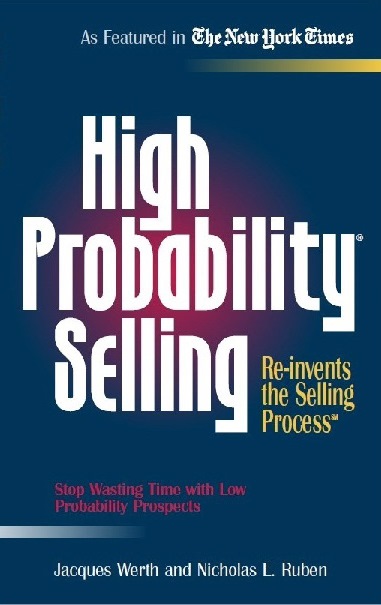
So You’ve Read the Book – Now What?
If you have any questions about High Probability Selling, we are having a live and interactive video meeting on Zoom
by Paul Bunn
A student recently asked us what they should do with a list of “lost deals”. And at what point is a deal or sale “lost”? In their case, a lost deal equated to a person who didn’t purchase what the student was selling, in the timeframe the student wanted them to buy.
This inquiry got me thinking about one of the fundamental parts of High Probability Selling that is often overlooked; the words and language we use casually that either enhances or detracts from an effective HPS mindset. Discerning this fundamental part requires listening to ourselves, specifically the words we choose.
My thinking and intuitive feel on the subject of a lost sale, is that a real loss only occurs if that person at that company says they never want to hear from you again. Everyone else who doesn’t want your service now falls into “not now”.
And although we commonly use “lost” in our sales language, there is really no such thing. You can only lose something you actually had in your possession in the first place.
And quite clearly, although our long-conditioned sales brain may initially say otherwise, when a person says “not now” it’s obviously not about losing a sale that we had in our possession. A sale we had in our imagination, a sale that existed in our mental map of the future perhaps, but an actual completed transaction? I think not.
Back in prehistoric days (the late 1900’s), I would drive past a McDonald’s and the sign would say over 10 million sold. The sign did not say that 50 million drove past a McDonald’s that century and never stopped.
What they paid attention to, and yes I used to work at McDonald’s, was the interaction with those people who stopped and bought a burger or two and some fries and a coke. A Quarter Pounder that nobody purchased was not a lost sale. It’s only part of an ongoing equation.
Another consideration is that sales is a person to person activity. Companies and businesses and organizations don’t buy anything. People are the ones who buy, or make the sale. And they do it for their own reasons in their own time. The goal of a High Probability Salesperson is to be in communication with them as close as possible to whenever their reasons align with the outcomes that our products or services provide, during the timeframe in which they are ready to buy.
So, at what point is a sale considered “Lost”? So infrequently, we never really measure them.
And what do we do with a list of “lost” deals? Continue prospecting to them like anyone else on your list.

If you have any questions about High Probability Selling, we are having a live and interactive video meeting on Zoom
Ultimately, staying in the game is the deepest Why behind our decisions. When examining how we make our decisions, we
Take the first step toward mastering a proven sales system that works. Whether you’re just starting with the High Probability Selling book or looking for advanced training and coaching, we have the tools to help you succeed. Explore our resources and begin transforming the way you sell—consistently and confidently.